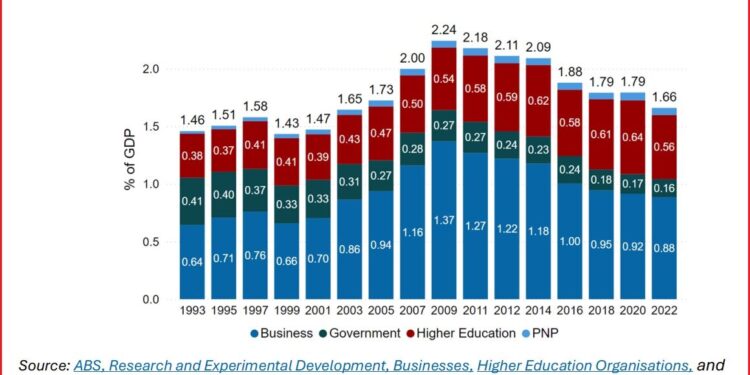The independent review by four industry experts, announced in December and led by Australian-born Tesla chair Robyn Denholm, released a discussion paper on Wednesday as it continued the first review into Australian R&D in almost two decades.
The nation’s “siloed” R&D system and “a business community that is largely indifferent” meant Australia’s economy was “unprepared to achieve sustained growth”, the discussion paper found.
Australia’s domestic investment in R&D has declined over the past 15 years, and now sits at 1.66 % of GDP — well below the 2.7% average in the OECD group of developed nations.
The main driver of this was “falling business and government R&D expenditure”, the expert panel said, and an extra $25.4 billion in R&D investment would be needed each year for Australia to reach the OECD average.
“Australia is a high performer in research,” the experts said.
“We produce 3.5% of the world’s publications and 5.8% of the world’s citations, and 15% Australian publications are in the top 10% of global publications.
“But much of this research rarely addresses the needs of the main users of research and innovation in Australia — industry, government and the community.”
Denholm said a strong R&D sector was “vital to the future of the country”.
“My objective through this examination is to unlock the immense potential of Australian research by turning it into tangible outcomes that deliver economic and societal benefits and enhance our global competitiveness,” she said.
Image: ‘Strategic Examination of R&D discussion paper’, Department of Industry, Science and Resources
R&D ‘barely engaged’ with Australia’s needs
Minister for Industry and Science, Ed Husic, said Australia was giving away its science and technology “to other countries to exploit”, during a speech at the National Press Club in Canberra on Wednesday.
The expert panel’s discussion paper made for “sobering reading”, he added.
“The panel describes our economy as one of the least differentiated in the world,” Husic said.
“And an R&D system that’s siloed and barely engaged with what the country needs.”
Husic said he was particularly “struck” by the panel’s finding that “Australian research is being developed into globally transformational technologies — most often by other countries”.
Part of the challenge Australia faced was convincing large companies to lift their investments in R&D, instead of relying on small-to-medium enterprises (SMEs), Husic said.
“Turning this around will take a concerted, coordinated, cooperative effort,” he said.
“But it will be an effort that is well worth it.”
Husic played down the reduction in government R&D spending in recent decades, when asked about it by Ability News.
He also did not state whether the government would alter its R&D tax incentives for businesses, but encouraged them to share their thoughts with the expert panel.
Politicising PsiQuantum deal
After pointing to R&D commitments in the National Reconstruction Fund and the federal government’s $470 million investment in PsiQuantum’s plan to build a quantum computer in Brisbane, Husic accused the opposition of politicising the government’s decision to support the US-based company.
The Coalition has pushed for a parliamentary inquiry into the government’s PsiQuantum deal, which is currently under independent review.
“I think they’ve made the wrong call — they have focused a lot on our investment in PsiQuantum and sought to politicise that, for example,” Husic said.
“Long term, let’s see how it plays outside, but I don’t think the mud they’ve thrown is going to stick, and it will be an important investment in long-term capability in this country, just like their investment in [American COVID-19 vaccine manufacturer] Moderna was.”
Aside from Denholm, the expert panel convened for the R&D review includes former chief scientist Ian Chubb, former Australian of the Year Professor Fiona Wood, and startups expert Dr Kate Cornick.
Their review is welcoming submissions until 11 April and is expected to report its findings by the end of 2025.
- This story first appeared on Information Age. You can read the original here.







